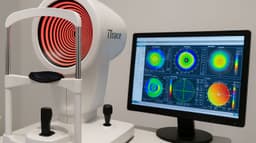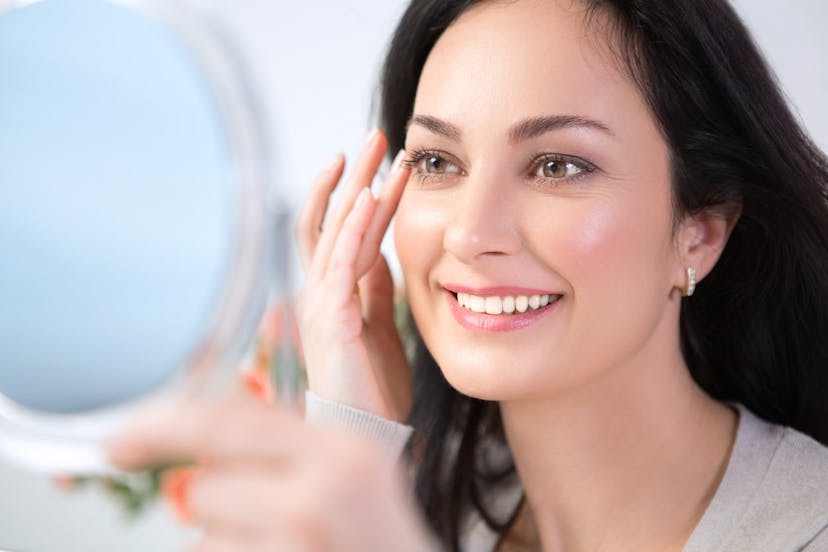
Understanding Dry Eyes: Causes, Symptoms, and Treatment Options
Welcome to My-iClinic, where your eye health is our top priority. In the bustling city of London, where screens, pollution, and environmental factors are a part of daily life, we understand the impact that dry eyes can have on your comfort and vision. Our team of experienced eye care professionals is dedicated to providing you with insights, solutions, and personalised care to conquer the discomfort of dry eyes.
In this article, we delve into the world of dry eyes – a condition that affects millions yet often goes unnoticed. We'll explore the causes, symptoms, and potential triggers unique to urban living in London. Our goal is to equip you with the knowledge needed to recognise the signs, understand the factors at play, and seek appropriate care to regain the clarity and comfort your eyes deserve.
At My-iClinic, we believe that informed patients are empowered patients. By sharing our expertise, we aim to guide you through the intricacies of dry eye syndrome, shedding light on the strategies and treatments that can make a significant difference in your day-to-day life. Let's embark on this journey together, as we uncover the path to healthier, more comfortable eyes amidst the vibrancy of London living.
What Are The Main Causes Of Dry Eyes?
Dry eyes, a common and uncomfortable condition, can be caused by a variety of factors that disrupt the normal tear film balance and lead to insufficient moisture on the eye's surface. The main causes of dry eyes include:
Environmental Factors
Exposure to dry or windy climates, air conditioning, and indoor heating can lead to increased evaporation of tears, contributing to dry eyes.
Screen Time
Extended periods of staring at digital screens, such as computers, smartphones, and tablets, can reduce the frequency of blinking, leading to inadequate tear distribution.
Age
As people get older, the natural production of tears tends to decrease. This is particularly common in individuals over the age of 50.
Hormonal Changes
Hormonal fluctuations, such as those that occur during pregnancy, menopause, or while using certain contraceptives, can affect tear production.
Medical Conditions
Conditions like rheumatoid arthritis, Sjögren's syndrome, diabetes, thyroid disorders, and autoimmune diseases can disrupt the balance of tear production and quality.
Medications
Some medications, including antihistamines, decongestants, antidepressants, and certain blood pressure medications, can reduce tear production as a side effect.
Contact Lenses
Improper use of contact lenses, wearing them for extended periods, or using contact lens solutions that don't match your eyes' needs can contribute to dry eyes.
Blinking Abnormalities
Certain conditions that affect eyelid function or the blinking reflex, such as blepharitis or meibomian gland dysfunction, can lead to insufficient tear distribution.
Eyelid Anatomy
Abnormalities in the eyelid structure, such as ectropion (outward turning of the eyelid) or entropion (inward turning of the eyelid), can disrupt the tear film.
Allergies
Allergic reactions, especially if they affect the eyes, can lead to increased tear evaporation and discomfort.
Lifestyle Factors
Smoking and exposure to secondhand smoke can exacerbate dry eye symptoms.
Nutrition
Inadequate intake of omega-3 fatty acids, found in foods like fish and flaxseed, can affect the composition of tears and exacerbate tired eyes. Eye nutrition plays a vital to help protect the natural health of your eyes.
Recognising the underlying causes of dry eyes is crucial for effective management and treatment. If you're experiencing persistent dry eye symptoms, seeking guidance from an eye care professional can help determine the root cause and tailor a suitable treatment plan.

What Are The Unusual Symptoms Of Dry Eyes?
While dry eyes often present with common symptoms like redness, itching, and discomfort, some unusual or less-known symptoms can also indicate the presence of dry eye syndrome. These less typical symptoms might not immediately be associated with healthy eyes, but they can still be indicative of the condition. Here are some unusual symptoms to watch out for:
Watery Eyes
Paradoxically, dry eyes can sometimes lead to excessive tearing. When the eyes lack sufficient moisture, they might respond by producing more reflex tears to compensate.
Sensitivity to Light
Dry eyes can make your eyes more sensitive to light, a condition known as photophobia. Bright lights, sunlight, or even normal indoor lighting can trigger discomfort.
Blurred or Variable Vision
Dry eyes can cause fluctuating vision quality, leading to intermittent blurriness that comes and goes. This can impact activities like reading, driving, or focusing on screens.
Foreign Body Sensation
People with red or tired eyes might experience the sensation of having something in their eye, like a grain of sand or a foreign object, even when there's nothing there.
Eye Fatigue
Dry eyes can contribute to eye strain and fatigue, especially after extended periods of reading, using digital screens, or focusing on detailed tasks.
Discomfort While Wearing Contact Lenses
If you wear contact lenses, dry eyes can make you feel uncomfortable, causing a sensation of dryness, irritation, or a foreign body in the eye.
Difficulty Crying
Tear production is crucial for emotional expression, and individuals with dry eyes might find it challenging to produce tears when crying.
Eye Redness Without Infection
Chronic redness in the absence of an eye infection or allergies could be a sign of dry eyes. The eyes might appear bloodshot due to irritation and inflammation.
Stringy Mucus
Unclean eyes can lead to an overproduction of mucus by the eye's glands, resulting in the sensation of having stringy mucus in the eyes.
Eye Pain
Some individuals with severe dry eyes might experience actual pain in the eyes, which can range from mild discomfort to more pronounced pain.
Difficulty with Night Vision
Dry eyes can worsen glare and halos around lights at night, affecting night vision and making driving in the dark more challenging.
If you're experiencing any of these unusual symptoms, it's important to consult an eye care professional for a thorough evaluation. Proper diagnosis and treatment can help alleviate discomfort and improve your overall eye health.

When Should You Worry About Eye Health?
Dry eyes, though often a benign condition, should prompt heightened concern under specific circumstances. If dry eye symptoms become persistent, intensify in severity, or significantly disrupt your daily life, it's imperative to view them as a genuine concern. Constant discomfort, itching, burning sensations, or a feeling of grittiness that persists over an extended period may indicate an underlying issue that merits attention. Additionally, if your dry eyes begin to hinder routine tasks such as reading, using digital devices, or driving, it's crucial to recognise this as a red flag for a more comprehensive evaluation.
Furthermore, dry eyes can become a substantial worry if they lead to vision disturbances or impact your ability to focus. Blurred vision, sensitivity to light, and difficulties with night vision are not to be taken lightly. Should you experience redness, or pain, or notice a decline in the quality of your vision, seeking professional guidance becomes a necessity. In such instances, prompt consultation with an eye care specialist is essential to identify potential underlying causes, receive tailored treatment, and alleviate any potential risks associated with untreated or unmanaged dry eyes.
What Treatments Are Available For Your Eyes?
Several treatment options are available to address the discomfort and symptoms of dry eyes. The appropriate treatment depends on the underlying cause and severity of the condition.
Artificial Tears
Over-the-counter lubricating eye drops, also known as artificial tears, can provide temporary relief by adding moisture to the eyes. There are various formulations available, so it's recommended to consult an eye care professional to determine the most suitable option.
Prescription Eye Drops
In cases of more severe dry eyes, your doctor may prescribe medicated eye drops that target inflammation or stimulate tear production. These prescription drops can provide longer-lasting relief and address specific causes.
Lifestyle Changes
Adjusting your environment and habits can make a significant difference. Blink more often, take breaks during screen time, use a humidifier in dry indoor spaces, and stay hydrated to maintain adequate tear production.
Nutritional Supplements
Omega-3 fatty acids, found in fish oil or supplements, can help improve the quality of tears and alleviate dry eye symptoms. Consult your doctor before adding supplements to your routine.
Eyelid Hygiene
Cleaning your eyelids regularly and effectively can help manage conditions like blepharitis, which can contribute to dry eyes.
Punctal Plugs
These tiny devices are inserted into the tear ducts to block drainage, keeping more tears on the eye's surface. This can help maintain moisture and relieve dry eye symptoms.
Thermal Treatment
Meibomian gland dysfunction (MGD) is a common cause of dry eyes. Thermal treatment, such as LipiFlow, helps unclog blocked glands and improve tear quality.
Intense Pulsed Light (IPL) Therapy
This non-invasive treatment targets inflammation in the meibomian glands, improving their function and alleviating dry eye symptoms.
Prescription Medications
In some cases, oral medications like cyclosporine or lifitegrast might be prescribed to reduce inflammation and promote tear production.
Scleral Lenses
These specialised contact lenses vault over the cornea and hold a reservoir of tears, providing continuous lubrication and relief for severely dry eyes.
Autologous Serum Eye Drops
For severe dry eye cases, serum eye drops made from a patient's blood can be prepared by a compounding pharmacy. These drops contain growth factors and nutrients that promote healing of the corneal surface.
It's important to consult an eye care professional before initiating any treatment. They can assess your specific condition, identify the underlying causes, and recommend a personalised treatment plan that addresses your unique needs and provides the most effective relief for your dry eyes.
20 FAQs About Dry Eyes
- What is dry eye syndrome? Dry eye syndrome, also known as dry eye disease, is a common condition where the eyes do not produce enough tears or produce poor-quality tears. This can result in discomfort, irritation, and a range of symptoms.
- What are the common symptoms of dry eyes? Common symptoms include dryness, stinging or burning sensations, redness, sensitivity to light, blurred vision, a sensation of grittiness, and eye fatigue.
- What causes dry eyes? Dry eyes can be caused by factors such as ageing, environmental conditions (wind, dry air), hormonal changes, medical conditions (rheumatoid arthritis*, Sjögren's syndrome*), medications, and prolonged screen time.
- Can dry eyes affect my vision? Yes, dry eyes can cause fluctuations in vision, leading to blurriness and difficulty focusing, particularly during prolonged tasks like reading or using screens.
- Are there different types of dry eye conditions? Yes, dry eyes can be classified into two main types: aqueous-deficient dry eye (inadequate tear production) and evaporative dry eye (tears evaporate too quickly due to a disrupted lipid layer).
- Who is more likely to develop dry eyes? Anyone can develop dry eyes, but it's more common among older individuals, women (especially during hormonal changes), contact lens wearers, and those with certain medical conditions.
- How is dry eye diagnosed by an eye doctor? An eye doctor may perform a comprehensive eye exam, including assessing tear production, quality of tears, evaluating corneal health, and discussing your symptoms and medical history.
- Can allergies contribute to dry eyes? Yes, allergies can contribute to dry eyes by causing inflammation and increasing tear evaporation. Allergy-related rubbing of the eyes can further exacerbate symptoms.
- Does using digital devices cause or worsen dry eyes? Yes, prolonged screen time can lead to reduced blink rate and tear evaporation, causing or exacerbating dry eyes. This is commonly referred to as "digital eye strain*."
- What role does age play in dry eye development? Ageing can lead to decreased tear production and changes in tear composition, making older individuals more susceptible to dry eyes.
- Can hormonal changes affect dry eyes? Yes, hormonal changes during pregnancy, menopause, and certain medical conditions can lead to dry eyes due to altered tear production and composition.
- How does indoor heating and air conditioning impact dry eyes? Indoor heating and air conditioning can reduce humidity, leading to increased tear evaporation and exacerbating dry eye symptoms.
- Can wearing contact lenses lead to dry eyes? Yes, contact lens wear can contribute to dry eyes, as lenses may disrupt the tear film and reduce tear stability, leading to discomfort.
- Are there certain medications that can cause dry eyes as a side effect? Yes, medications like antihistamines, decongestants, antidepressants, and certain blood pressure medications can reduce tear production or quality as a side effect.
- What lifestyle changes can help alleviate dry eye symptoms? Lifestyle changes include staying hydrated, taking regular breaks during screen time, maintaining a humid environment, practising proper eyelid hygiene, and incorporating omega-3 fatty acids into your diet.
- What treatments are available for dry eyes? Treatments range from over-the-counter artificial tears and prescription eye drops to lifestyle adjustments, in-office procedures (punctual plugs, LipiFlow), and management of underlying conditions.
- Can over-the-counter eye drops effectively treat dry eyes? Yes, over-the-counter artificial tears can provide temporary relief by lubricating the eyes. However, it's important to choose the right type of eye drop for your specific needs.
- Are there prescription medications for severe dry eye cases? Yes, prescription eye drops like cyclosporine (Restasis) and lifitegrast (Xiidra) can be prescribed to reduce inflammation and improve tear production.
- Can dry eyes be permanently cured? While dry eye may not always be permanently cured, its symptoms can be effectively managed and alleviated with the right treatments, lifestyle adjustments, and ongoing care.
- How can I prevent dry eyes from occurring or worsening? Preventive measures include practising good eye hygiene, staying hydrated, taking breaks during screen time, using humidifiers, wearing protective eyewear in windy or dry environments, and seeking professional advice for optimal eye health.
*Digital eye strain
Digital eye strain, also known as computer vision syndrome, is a condition characterised by a range of uncomfortable symptoms that result from prolonged use of digital screens, such as computers, smartphones, tablets, and e-readers. As digital devices have become integral to modern life, many people spend extended periods of time staring at screens, which can lead to various visual and physical discomforts.
Common symptoms of digital eye strain include:
- Eye Discomfort - Dryness, itching, burning sensations, and a gritty feeling in the eyes.
- Blurry Vision - Temporary blurriness, especially after extended screen use.
- Eye Fatigue - Tiredness and strain in the eyes, often accompanied by headaches.
- Sensitivity to Light - Increased sensitivity to light, especially after prolonged screen exposure.
- Difficulty Focusing - Trouble focusing on objects in the distance after prolonged close-up screen use.
- Neck and Shoulder Pain - Poor posture while using screens can lead to neck and shoulder discomfort.
Digital eye strain is caused by several factors associated with screen use:
- Blinking Less - When focusing on screens, people tend to blink less, reducing tear distribution and causing dryness.
- Blue Light Exposure - Digital screens emit blue light, which can contribute to eye strain and disrupt sleep patterns.
- Close-Up Focus - Staring at screens up close for prolonged periods can strain the eye's focusing muscles.
- Screen Glare and Contrast - Poor lighting conditions and glare on screens can strain the eyes.
- Posture - Poor posture while using devices can lead to neck, back, and shoulder discomfort.
Preventing and managing digital eye strain involves adopting healthy habits:
- 20-20-20 Rule - Take a 20-second break every 20 minutes and focus on something 20 feet away.
- Blink Regularly - Be conscious of blinking to keep the eyes moist.
- Proper Lighting - Ensure appropriate lighting, reduce screen glare, and adjust screen contrast.
- Screen Position - Position screens at a comfortable distance, slightly below eye level.
- Computer Glasses - Consider special eyeglasses designed for screen use.
- Blue Light Filters - Use blue light filters on screens or wear blue light-blocking glasses.
- Regular Eye Exams - Routine eye exams can detect and address any vision changes.
Managing digital eye strain can significantly improve eye comfort and reduce discomfort associated with screen use. If symptoms persist or worsen, consulting an eye care professional is recommended to rule out any underlying issues and receive personalised advice.
Expert Help From A Private Ophthalmologist
Are you tired of the discomfort and irritation caused by dry eyes? At My-iClinic, we understand the impact that dry eye symptoms can have on your daily life. That's why we're here to offer you specialised care and solutions tailored to your unique needs.
Our team of experienced ophthalmologists is dedicated to providing comprehensive assessments and personalised treatment plans for dry eyes. By utilising state-of-the-art technology, including advanced diagnostic tools, we're able to monitor your dry eye symptoms with precision and accuracy.
Take the first step towards comfort and clearer vision. Whether you're experiencing occasional discomfort or persistent dryness, our private ophthalmologist will work closely with you to identify the root cause of your symptoms and recommend effective strategies for relief.
Don't let dry eyes disrupt your well-being any longer. Contact us today to schedule your consultation and embark on a journey towards healthier, happier eyes. Trust My-iClinic to be your partner in achieving optimal eye health.
Find out more by Speaking to our team









